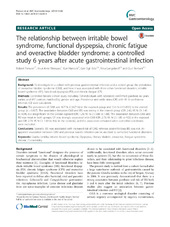The relationship between irritable bowel syndrome, functional dyspepsia, chronic fatigue and overactive bladder syndrome: A controlled study 6 years after acute gastrointestinal infection
Persson, Robert; Wensaas, Knut-Arne; Hanevik, Kurt; Eide, Geir Egil; Langeland, Nina; Rørtveit, Guri
Peer reviewed, Journal article
Published version

Åpne
Permanent lenke
https://hdl.handle.net/1956/10919Utgivelsesdato
2015-06-10Metadata
Vis full innførselSamlinger
Originalversjon
https://doi.org/10.1186/s12876-015-0296-0Sammendrag
BACKGROUND: To investigate in a cohort with previous gastrointestinal infection and a control group the prevalence of overactive bladder syndrome (OAB), and how it was associated with three other functional disorders; irritable bowel syndrome (IBS), functional dyspepsia (FD) and chronic fatigue (CF). METHODS: Controlled historic cohort study including 724 individuals with laboratory confirmed giardiasis six years earlier, and 847 controls matched by gender and age. Prevalence and odds ratios (OR) with 95 % confidence intervals (CI) were calculated. RESULTS: The prevalence of OAB was 18.7 % (134/716) in the exposed group and 13.6 % (113/833) in the control group (p = 0.007). The association between OAB and IBS was strong in the control group (OR: 2.42; 95 % CI: 1.45 to 4.04), but insignificant in the Giardia exposed (OR: 1.29; 95 % CI: 0.88 to 1.88). The association between OAB and FD was weak in both groups. CF was strongly associated with OAB (OR: 2.73; 95 % CI: 1.85 to 4.02 in the exposed and OR: 2.79; 95 % CI: 1.69 to 4.62 in the controls), and this association remained when comorbid conditions were excluded. CONCLUSIONS: Sporadic IBS was associated with increased risk of OAB, whereas post-infectious IBS was not. An apparent association between OAB and previous Giardia infection can be ascribed to comorbid functional disorders.
